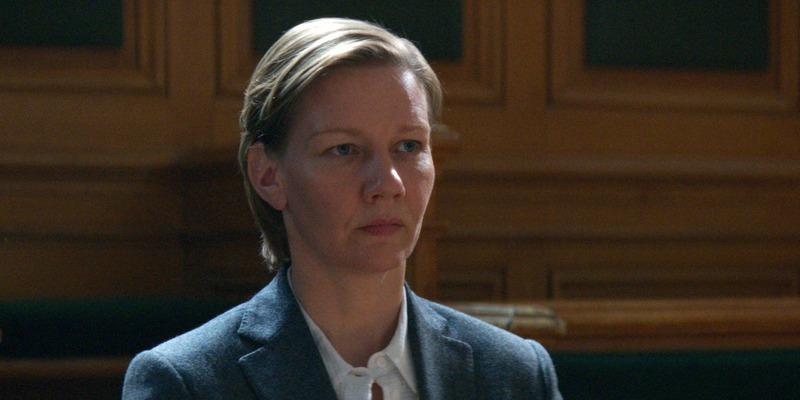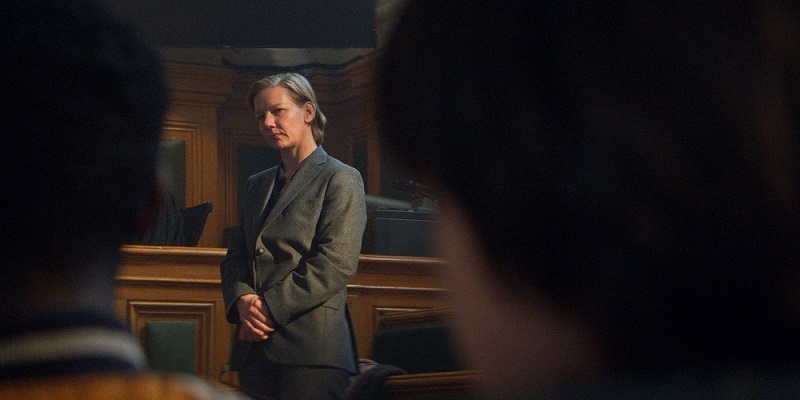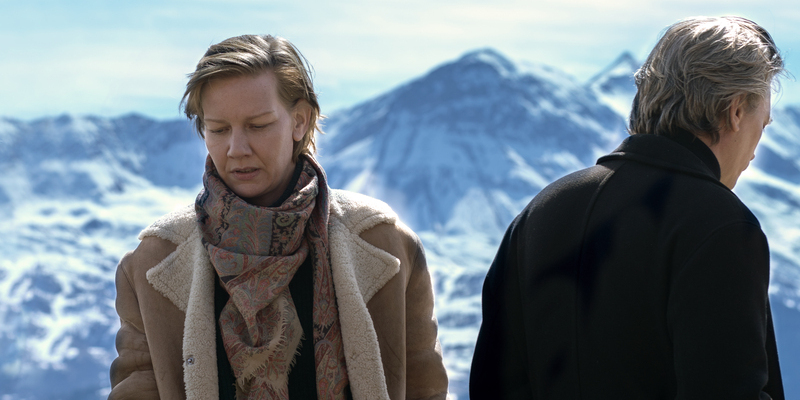
Review by
Eric Hillis
Directed by: Justine Triet
Starring: Sandra Hüller, Swann Arlaud, Milo Machado Graner, Antoine Reinartz, Samuel Theis, Jehnny
Beth, Saadia Bentaïeb, Camille Rutherford

Justine Triet opens her courtroom drama
Anatomy of a Fall with some steel band instrumental music
and closes it with a Chopin piece. Nothing notable about that you might
think, but the steel band number is a cover of rapper 50 Cent's
misogynistic fantasy PIMP, and the Chopin piece will resonate with Serge
Gainsbourg fans as the tune from Jane B, in which the songwriter
imagines the murder of his lover, Jane Birkin, possibly by his own
hands. These musical choices tie into an idea later raised in the
courtroom, that of whether an artist can be separated from their art.
Should we view the likes of 50 Cent and Gainsbourg with suspicion, or
are they simply acting out fantasies within their work? If either of the
two had ever found themselves accused of killing a woman, no doubt the
prosecution would have attempted to use their words against them.
In Anatomy of a Fall, Sandra Hüller, of
Toni Erdmann
fame, plays Sandra Voyter, a German author whose books are known for
being based on personal experience and reflecting personal thoughts. One
of her books features a narrator fantasising about how she might kill
her husband, a passage seized upon by the prosecution when she goes to
trial accused of killing her own husband, Samuel (Samuel Theis).

Samuel's body is discovered in the snow outside their home in Grenoble
(a city which on the evidence of this,
Saturn Bowling
and
The Night of the 12th
must have a homicide rate to rival Cabot Cove) by the couple's blind son
Daniel (Milo Machado-Graner). It seems that he fell from a
second-storey window, and the subsequent trial asks its jury to decide
whether he jumped or was pushed by Sandra. An autopsy having discovered
he received a blow to the head before hitting the ground raises the
question of whether he hit his head on the roof of a tool shed while
falling, or if he was struck by Sandra before she pushed him out the
window.
Unlike a Hitchcock movie or an episode of Columbo, the film doesn't establish Sandra's guilt. Nor is it a whodunit.
There's never any suggestion that any third party might have been
involved in Samuel's death. His demise could only have come at his own
hands or those of his wife.
Anatomy of a Fall departs from standard courtroom
thrillers in that it's not particularly concerned with whether Sandra is
guilty or not, but rather whether she'll be found guilty or innocent of
the crime. By refusing to reveal Sandra's guilt, the film is an
important reminder that no matter how much gossip we might ingest or how
many courtroom transcripts we might pore over, we can never know the
truth of a relationship between two people. Everyone seems to have an
opinion on Johnny Depp and Amber Heard, on Mia Farrow and Woody Allen,
but none of us really know anything about these people.

Triet's film, co-written with her own romantic partner
Arthur Harari (awkward or what?), is a brutal take on the flaws
of the legal system. It's made clear throughout that neither the defence
nor the prosecution care whether Sandra is guilty or not; all that
matters is getting the result expected of their side. After centuries of
refinement, this is still the best we can come up with, but what's the
alternative? The great issue with this system is of course that it's
skewed in favour of those who can afford the best legal representation.
That's not an issue for the affluent Sandra, plus her lawyer (Swann Arlaud) happens to be a family friend who has long harboured feelings for the
accused. Yet she still finds her words (both those she has written in
her work and those she speaks in her defence) manipulated by the
prosecution.
This idea of being betrayed by words runs throughout
Anatomy of a Fall. The film's one all too convenient contrivance asks us to accept that
Samuel recorded many of his conversations with his wife. One is a
blazing row that Triet initially visualises via flashback, only to cut
to the courtroom as the jurors listen to the audio at the point where it
appears to escalate to physical violence. It's unclear which of the two
is perpetrating the violence, but Sandra is damned by her angry words.
And then there's the content of her work, slyly manipulated by the
prosecution to suggest confessional autobiography rather than literary
fantasy. "Is Stephen King a serial killer?" Sandra's lawyer retorts to
the suggestion.
It's no surprise then that Sandra is careful which words to use, and in
which language. Outside the courtroom we see her speak French with
seemingly no issues, but in the courtroom she insists on speaking
English. Is she simply ensuring she says exactly what she means, or is
this obfuscation a sign of her guilt?

Along with the jury and the viewer, Sandra's guilt is unknown to her
own son. Again it's never quite clear, but the film poses the idea that
having lost one parent he might be willing to ignore any doubts to
ensure he doesn't also lose his mother. It's the child's hands that play
the Chopin/Gainsbourg piece, adding further questions. Is he playing
Chopin or Gainsbourg? Is he thinking purely of musical notes as he plays
or the grisly words that later became associated in French pop culture
with those notes?
Hüller's enigmatic performance keeps us guessing as to the nature of
Sandra's guilt. Some may read her calmness as a lack of remorse, others
as simply Teutonic repose. When she panics at questioning from the
prosecution, is it because she fears her guilt is about to be exposed or
because her innocence is being dismissed? Sandra lies over certain
details, like how she acquired bruising on her arms. Is she doing this
to cover her tracks or to avoid being railroaded into digging a hole for
herself? Each viewer will come to their own conclusion, but none of us
can say for certain. Triet and Huller have publicly stated that even
they don't know whether their protagonist is guilty or not, and it's
their movie. What gives the rest of us the right to pass
judgement?


